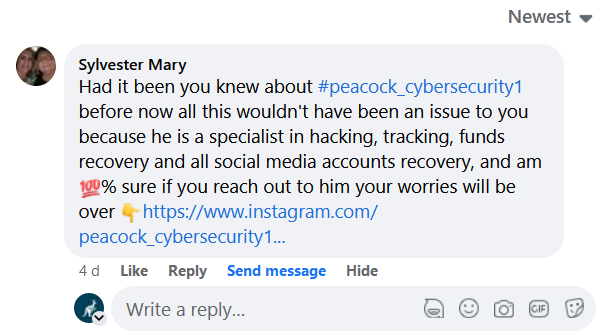
An example of scammer you might see on Facebook
In the interconnected world of social media, staying vigilant against online scams is crucial to safeguarding your personal and financial information. Recently, Refundaroo has observed a troubling trend on Facebook: individuals posing as “hackers for hire,” exploiting unsuspecting users with promises of recovering lost funds or hacking into accounts for a fee. Here’s how you can identify and steer clear of these deceptive schemes:
- Unsolicited Offers: Refrain from engaging with unsolicited messages or friend requests from individuals claiming to offer hacking services. Legitimate professionals typically do not initiate contact in such a manner.
- Too Good to Be True Claims: Exercise caution if an offer guarantees the recovery of lost funds or claims to hack any account for a nominal fee. Legitimate hackers do not make unrealistic promises or engage in illegal activities.
- Verification of Credentials: Genuine hackers often have verifiable credentials, portfolios, or affiliations with reputable organizations. Scammers, on the other hand, lack credible evidence of their expertise.
- Upfront Payments: Be wary of hackers who insist on upfront payments, especially through untraceable methods like gift cards or cryptocurrency. Reputable professionals outline terms and conditions and use secure payment methods.
- Pressure Tactics: Scammers may create a sense of urgency or offer limited-time deals to pressure you into immediate action. Legitimate service providers allow you time to assess their legitimacy and services.
- Communication Quality: Pay attention to the quality of communication. Scammers often exhibit poor grammar, spelling errors, or inconsistencies in their messages—a telltale sign of potential fraudulent activity.
- Realistic Expectations: Understand that it is unrealistic for any hacker to guarantee the recovery of lost funds or engage in activities that defy legal and ethical boundaries. Exercise skepticism toward claims that seem too good to be true.
In conclusion, while the internet presents numerous opportunities, it also poses risks from scammers seeking to exploit vulnerabilities. Protect yourself by verifying credentials, maintaining skepticism, and refraining from engaging with individuals offering dubious hacking services. Remember, legitimate professionals adhere to ethical standards and do not participate in illegal activities. By staying informed and vigilant, you can safeguard your personal and financial security in the digital era. Refundaroo urges all users to stay cautious and report suspicious activities to help create a safer online community for everyone.


